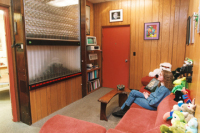
The PEAR Lab
The Princeton Engineering Anomalies Research (PEAR) Lab was founded in 1979 by Robert G. Jahn, a professor of aerospace engineering and Dean of the School of Engineering and Applied Science at Princeton University. The lab's objective was to study the ability of consciousness to influence physical processes. The lab was managed by Brenda Dunne, a developmental psychologist trained at the University of Chicago, and had a full-time staff of half a dozen scientists as well as numerous interns and visiting researchers.
During its 28-year history, the lab worked to study and understand the anomalous impact that the mind seemed to have on physical devices, including electronic random event generators (REGs). Research was also conducted into remote perception, the ability of a person to perceive information that should be inaccessible through the standard senses.
All the experiments at the lab were conducted using volunteers, and the overall experimental databases provided highly statistically significant evidence that the effects being observed, though small in magnitude, were not simply a chance occurrence. In short, the lab used the scientific method to show results that can not be explained by our current understanding of science.

This video is sampled from The PEAR Proposition DVD set, an eight-hour overview of the research conducted at the PEAR lab that provides a more detailed understanding of the twenty-eight year history of this work.
 More Background Research
More Background Research
For more information, visit the PEAR website or click the links below.
 PEAR Intention Experiments
PEAR Intention Experiments
 PEAR FieldREG Experiments
PEAR FieldREG Experiments
 PEAR Conclusions
PEAR Conclusions